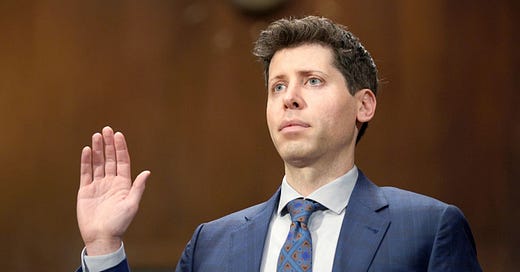Don't Trust Sam Altman's Concern Trolling over AI Future
He's got a horse in this race and the idea that he's just some lovely fairy godfather of tech's newest toy is naive at best, self serving and anti competitive at worst.
When Sam Altman, CEO of OpenAI, made his first appearance before Congress, he offered what at first glance might seem a surprising stance - in favor of tighter regulation on the swiftly evolving AI industry. Altman suggested the creation of a new agency to oversee the development of artificial intelligence, echoing the sentiments of Senate Judiciary Chair Sen. Dick Durbin and Republican Sen. Lindsey Graham. While this advocacy for regulation may seem counterintuitive for a tech CEO, a deeper look at the situation reveals a potential strategic motive.
A leaked internal memo from Google offers a glimpse into the competitive landscape of the AI industry. The anonymous author, a senior software engineer, expressed concern over the swift advancements made by open-source AI projects, which could potentially eclipse the achievements of tech giants like Google and OpenAI. The memo highlighted the lack of a "moat," or competitive advantage, for both companies, given the rapid advancements and customizability of open-source AI models.
In this context, Altman's support for regulation begins to make sense. Strict regulatory oversight could potentially create barriers to entry for open-source projects, helping OpenAI maintain its foothold in the industry. While Altman claims no intention of monetizing OpenAI, the desire for influence over the future of AI can't be discounted.
This regulatory "moat" strategy has been the subject of scrutiny, particularly since the open-source AI movement threatens to drastically disrupt the status quo. Open-source models like LLaMA, a 65-billion parameter large language model recently leaked from Meta, have been rapidly adopted by the AI community. These models offer a level of customization and privacy that could potentially outpace the capabilities of large tech corporations.
While Google has traditionally encouraged its AI researchers to share their findings publicly, a recent shift in policy suggests a change in strategy. The company is now focusing on converting AI breakthroughs into products before sharing research papers - a move that, in light of the leaked memo, can be seen as a response to the open-source threat.
The leaked Google memo, though expressing a single point of view, highlights the significance of the open-source movement in the AI industry, one that Altman is no doubt all too aware of. The developments following the leak of LLaMA, and the subsequent explosion of innovation based on it, suggests that the future of AI could indeed be in the realm of open-source. The question then arises: Will regulation, as proposed by Altman, be able to safeguard the interests of organizations like OpenAI, or will the open-source wave prove to be unstoppable?
Regardless of Google's internal decision-making in response to the memo, the document provides valuable insights into the state of the AI competitive landscape. As the debate over AI regulation unfolds, the tech world watches with anticipation, knowing that the outcomes will shape the future of AI - a future where influence, rather than profits, might be the ultimate prize.




